
Application Tips
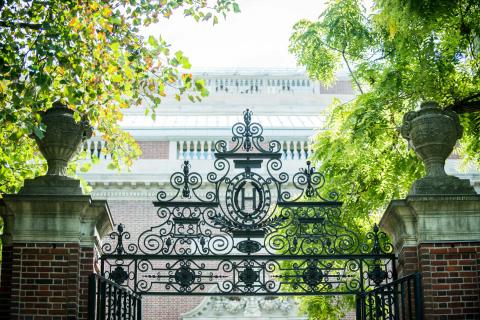
We're here to help
To apply for admission as a first-year or transfer student at Harvard, you will start with the Application. Fill out the Common Application or the Coalition Application, Powered by Scoir (choose one, we have no preference), followed by the supplement to help us get a better sense of who you are. Not sure where to start? We've gathered some helpful tips on how to fill out the main application and the Harvard supplement.
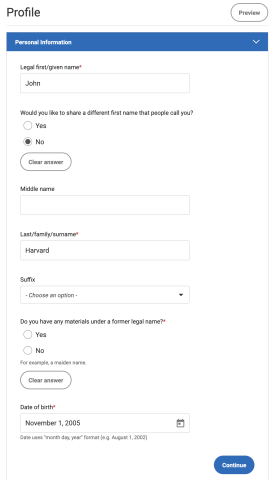
Profile
The Profile section is a place where you'll share detailed information about yourself, including contact information, demographics, and fee waiver request. It's always a good idea to review the information here and update any details, if necessary. Please note that none of the demographic questions in this section are required.
Profile Section
-
Please fill out your name exactly as it will show up on all materials we receive for your application. Your teachers, college counselors and others should also use your legal name just as it will appear on your financial aid forms, official test score reports, etc. Use of a nickname can cause your application to be incomplete if we cannot match your materials to your application.
-
Citizenship does not in any way affect your chances of admission or eligibility for financial aid at Harvard. There is no admissions advantage or disadvantage in being a US citizen. This is not the case at all institutions.
For students who need a visa to study in the United States, this question is of critical importance: we begin to prepare the forms that qualify you for a visa immediately after acceptance. Any delay in this process can jeopardize your chances of arriving in Cambridge in time to begin the fall semester.
-
Your U.S. Social Security number is kept strictly confidential and is used solely to match up your admissions and financial aid data if you are applying for aid.
-
The applications of veterans are most welcome and your service is a positive factor in our admissions process. We’re proud to help veterans continue their education by participating in the Yellow Ribbon Program and Service to School’s VetLink program. Learn more about applying as a veteran here.
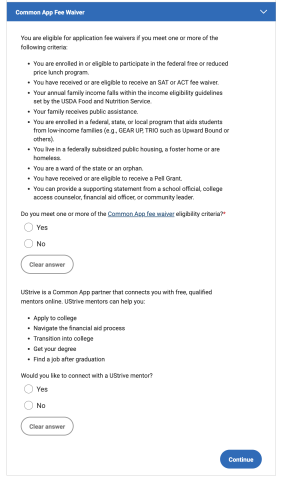
Application Fee Waiver
The application fee covers a very small portion of the administrative costs of processing applications. However, if the fee presents a hardship for you or your family, it will be waived. Each applicant applying with a fee waiver should select an option for a need-based fee waiver. Do not let the application fee stand in the way of applying!
-
Do not let the admissions application fee prevent you from applying! In the spirit of our honor code, if the admissions application fee presents a hardship for you or your family, the fee will be waived. Please follow the steps below to request a fee waiver:
Common Application
- Confirm that you meet at least one of the indicators of economic need and then select “Yes” to the prompt “You are eligible for application fee waivers if you meet one or more of the following criteria."
- Complete the fee waiver signature.
Coalition Application
- Confirm that you meet at least one of the indicators of economic need listed in the Fee Waiver section of your Profile.
- If you do not meet one of the indicators of economic need, you may enter the Harvard-specific fee waiver code on the payment page: JH3S5Q2LX9
Transfer Applicants
- Please send an email to adm-tran@fas.harvard.edu to request a transfer application fee waiver.
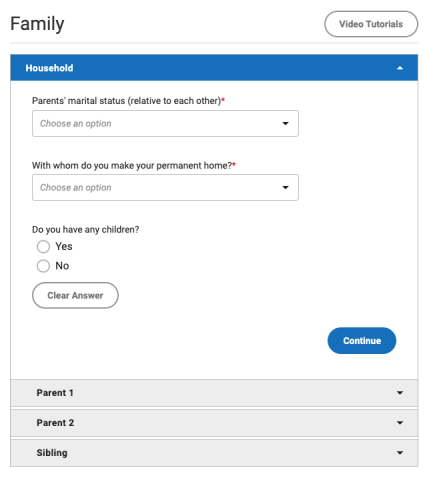
Family
In the family section, you'll share information about your household, your parents, and any siblings. Most colleges collect this information for demographic purposes. Even if you're an adult or an emancipated minor, you'll need to fill out this section.
Household
-
Answer the questions as honestly and fully as you can, but don’t worry if you and your parent/guardian do not know all of the details about your family.
-
Part of an admissions officer’s job in reading your application is to understand your background and how these circumstances have affected your upbringing, the opportunities available to you, academic preparation, and other factors relevant to the college admissions process.
Family life is an important factor in helping us to learn more about the circumstances and conditions in which you were raised, and how you have made the most of the opportunities provided by your family. We want to understand where you’re coming from, not only in school, but at home as well.
-
Parents almost always have a significant effect on students’ lives. Information about parents may indicate challenges you have faced – and overcome. In your essay you might elaborate on your family experiences in a wide variety of ways that can illuminate your character and personal qualities, including the positive aspects of your family life.
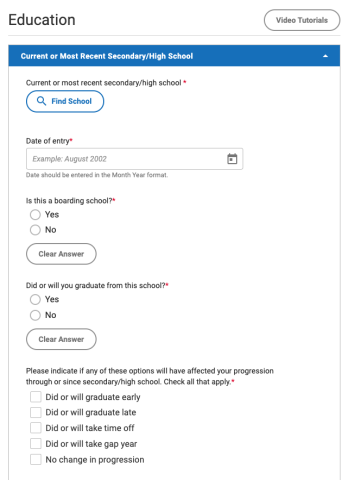
Education
In the Education section is where you will share information about your current school or coursework, academic honors, and future education plans. Here are some tips on commonly asked questions.
-
It is not uncommon for students to change schools or take time off during high school. While this information will most likely appear on your transcript, hearing directly from you about any interruption in schooling will help us to fill in any gaps.
-
We always defer to the secondary school report for information about grades. If yours is not provided by the counselor or school, we will take into consideration what is self-reported, making sure to confirm with your school officials.
-
Please list the courses you are currently taking and/or are planning on taking before you graduate. If your schedule changes after you have submitted your application, please keep us updated by submitting additional materials in the Applicant Portal.
-
This is a place to highlight any achievements or awards you have received. If you receive any significant honors or awards after submitting the application, you may notify us by submitting additional materials in the Applicant Portal and we will include this information with your application materials.
-
You do not need to have a ten year plan, but getting a sense of what kinds of professions you have considered gives us insight into your current plans. Don’t fret about it: put a few ideas down and move on with your application.
Since there are some students who do have a developed career interest already established while they are in high school, this question provides an opportunity to indicate such a plan.
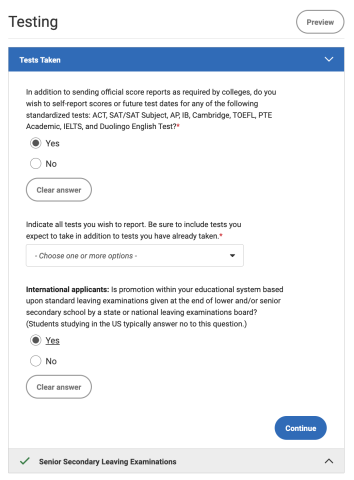
Testing
The Testing section is where you'll enter your self-reported scores for any official standardized tests that you've taken and wish to report to colleges. Do not submit practice test scores. If you have not yet taken the test, just indicate the date of your test sitting and submit those scores at a later date. Once you receive scores after you've submitted an application, you can complete a testing form in the applicant portal to share your official scores.
And remember - if you self-report your SAT or ACT test scores and you are admitted and choose to enroll at Harvard, you'll be required to submit your official score reports from the College Board or ACT. View more information on our standardized testing requirements on our Application Requirements page.
Tests Taken
-
We have always looked at the best scores applicants choose to submit. If you haven’t yet taken the tests, please indicate which tests you are taking and when.
-
The TOEFL is not required for Harvard, but if you are taking it for another college, you may elect to submit it as part of your Harvard application. Your score can be one more piece of evidence regarding your English language proficiency, so you may choose to submit it if you feel it provides additional helpful information.
-
These exam scores are additional pieces of academic information which can help us as we think about your preparation and potential for college level work. Sometimes AP or IB scores can demonstrate a wide range of academic accomplishments.
If you have the opportunity to take AP and IB exams, the results may also be helpful for academic placement, should you be accepted and choose to enroll at Harvard.
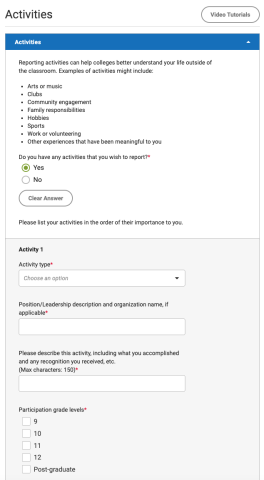
Activities
The activities section gives you the opportunity to tell schools more about who you are and activities you're involved with outside the classroom. You'll have the opportunity to list up to ten activities, but that doesn't mean you need to enter all ten.
-
We are much more interested in the quality of students’ activities than their quantity so do not feel you need to fill in the entire grid! Contributions students make to the well-being of their secondary schools, communities and families are of great interest to us. So indicate for us the time you spend and the nature of the contribution to extracurricular activities, the local community, work experiences and help provided to your family. Activities you undertake need not be exotic but rather might show a commitment to excellence regardless of the activity. Such a commitment can apply to any activity in your life and may reflect underlying character and personal qualities.
For example, a student can gain a great deal from helping his or her family with babysitting or other household responsibilities or working in a restaurant to help with family or personal expenses. Such experiences are important “extracurricular” activities and can be detailed in the extracurricular section and discussed in essays.
Some students list only activities they feel will appear significant to the admissions office, while others endeavor to list every single thing they have ever done. Neither approach is right for everyone. Rather, you should think about the activities (in-school, at home, or elsewhere) that you care most about and devote most of your time doing, and list those.
We realize that extracurricular and athletic opportunities are either unavailable or limited at many high schools. We also know that limited economic resources in many families can affect a student’s chances for participation on the school teams, travel teams, or even prevent participation at all due to the costs of the equipment or the logistical requirements of some sports and activities. You should not feel that your chances for admission to college are hindered by the lack of extracurricular opportunities. Rather, our admissions committee will look at the various kinds of opportunities you have had in your lifetime and try to assess how well you have taken advantage of those opportunities.
For additional thoughts on extracurricular activities, please refer to this 2009 article in the New York Times: Guidance Office: Answers From Harvard’s Dean, Part 3.
-
In this section, please describe the activity and your level of participation. Please note that your description should be concise, or it may be cut off by the Common Application.
-
The grades during which you have participated are important because they help us to understand the depth of your involvement in that activity and your changing interests over time. Not all extracurricular activities must be a four-year commitment for our applicants.
-
We are interested to know how you manage your time and to understand how you balance your life outside of the classroom. Some students dedicate their time to one or two activities, while others spread their time among many.
-
We know that students are often active both during the school year and the summer – working, babysitting siblings, enrolling in courses, traveling, playing sports, holding internships, etc. Distinguishing school-year activities from summer activities helps us understand how you have spent your time and taken advantage of opportunities available to you.
-
Harvard is a residential institution, and our students are actively engaged in college life. This section helps us to understand how you might contribute at Harvard. Some students who were involved in several activities during high school choose to narrow their focus in college and/or to try new activities not previously available.
-
Filling out the grid is an act of prioritization: your responses tell us what activities or work experiences are most meaningful to you. And there’s quite a bit of space there, too; almost everyone should be able to convey the breadth and depth of out-of-class commitments on the application. Conversely, please do not feel a need to fill every line!
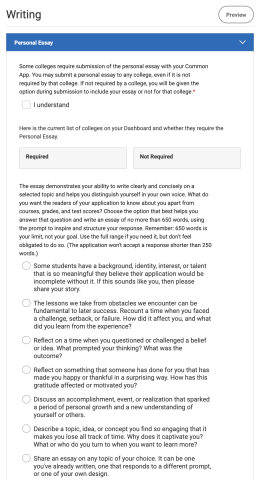
Writing
The first section is the personal essay. Harvard requires the submission of the personal essay with your application. We also offer an opportunity to add any additional information.
-
The Common Application essay topics are broad. Please note that Coalition essay questions may differ. While this might seem daunting at first, look at it as an opportunity to write about something you care about, rather than what you think the Admissions Committee wants to hear. The point of the personal statement is for you to have the chance to share whatever you would like with us. Remember, your topic does not have to be exotic to be compelling.
Essay topics include:
- Some students have a background, identity, interest, or talent that is so meaningful they believe their application would be incomplete without it. If this sounds like you, then please share your story.
- The lessons we take from obstacles we encounter can be fundamental to later success. Recount a time when you faced a challenge, setback, or failure. How did it affect you, and what did you learn from the experience?
- Reflect on a time when you questioned or challenged a belief or idea. What prompted your thinking? What was the outcome?
- Reflect on something that someone has done for you that has made you happy or thankful in a surprising way. How has this gratitude affected or motivated you?
- Discuss an accomplishment, event, or realization that sparked a period of personal growth and a new understanding of yourself or others.
- Describe a topic, idea, or concept you find so engaging that it makes you lose all track of time. Why does it captivate you? What or who do you turn to when you want to learn more?
- Share an essay on any topic of your choice. It can be one you've already written, one that responds to a different prompt, or one of your own design.
-
Do not feel obligated to fill this space, but some students have used this opportunity to tell us about challenging circumstances in their lives such as illness or other difficulties that may have affected their grades. Any information that can tell us more about the person behind the test scores and grades can be helpful.
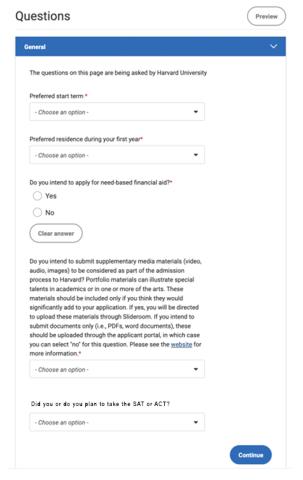
Harvard Questions
Each college or university that is a member of the Common Application and/or the Coalition Application - Powered by Scoir has an opportunity to ask applicants a series of school-specific questions separate from the common part of the application. The Harvard supplement contains a series of questions that help us learn more about your academic, extracurricular, and personal interests. Your application is not considered complete until you submit the supplement.
-
Harvard has a need-blind admissions process and applying for aid is never detrimental to your admissions decision. We ask this question because we want to be able to calculate your financial need in advance of our April notification date so that we can send your admission letter and financial aid offer at the same time. One thing to note – not all institutions have such policies.
-
Supplementary materials (art slides, music recordings, research papers, etc.) help when they reveal unusual talent. You absolutely do not have to include anything supplementary to gain acceptance to Harvard, and the vast majority of admitted students do not submit supplementary materials with their applications. You can submit art and media files through Slideroom and any documents or articles directly in the Applicant Portal with an uploader tool.
-
When you select from the full list of Harvard's academic concentrations, you give us a sense of the direction you may choose when it comes time for you to choose a concentration at Harvard in your sophomore year.
While we realize that this question is quite similar to the one asked on the Common Application, our own format allows us to fit this information into data fields that Harvard has been collecting for many years. While we know students might well change their minds once they are in college, it is helpful for us to get a sense of their current interests and those academic areas in which they have already spent time and effort.
We do not admit students into specific academic programs, and we have no quotas or targets for academic fields.
-
As a liberal arts institution with fifty academic concentrations and more than 450 extracurricular organizations, we expect and encourage our students to explore new opportunities. We understand that as you answer these questions, you may not be entirely sure of your plans, but this information helps us to understand how you might use Harvard.
-
One of the principal ways students meet and educate each other during college is through extracurricular activities. Your answer to this question gives us a better sense of the interests you might bring to college and how definite your academic, vocational, extracurricular or athletic interests might be. This information helps us understand better how you might use Harvard. Of course, one of the best things about a liberal arts education is that plans may change. There is no “right” answer to these questions.
-
If you have applied to Harvard before, we want to include your previous application with your current one. We also want to have a record of any other involvement at Harvard you may have had, including the Summer School and the Extension School and associated transcripts. This information adds to the context of your present application. It can be helpful for us to note changes in your application—perhaps areas where you have strengthened the academic and/or extracurricular aspects of your candidacy.

Writing Supplement
The supplement includes five required short-answer questions, each with a 150 word limit. We want to ensure that every student has the same opportunity to reflect on and share how their life experiences and academic and extracurricular activities shaped them, how they will engage with others at Harvard, and their aspirations for the future. Our continued focus is on considering the whole student in the admissions process and how they have interacted with the world.
-
Each question has a 150 word limit.
- Harvard has long recognized the importance of enrolling a student body with a diversity of perspectives and experiences. How will the life experiences that shaped who you are today enable you to contribute to Harvard?
- Describe a time when you strongly disagreed with someone about an idea or issue. How did you communicate or engage with this person? What did you learn from this experience?
- Briefly describe any of your extracurricular activities, employment experience, travel, or family responsibilities that have shaped who you are.
- How do you hope to use your Harvard education in the future?
- Top 3 things your roommates might like to know about you.
